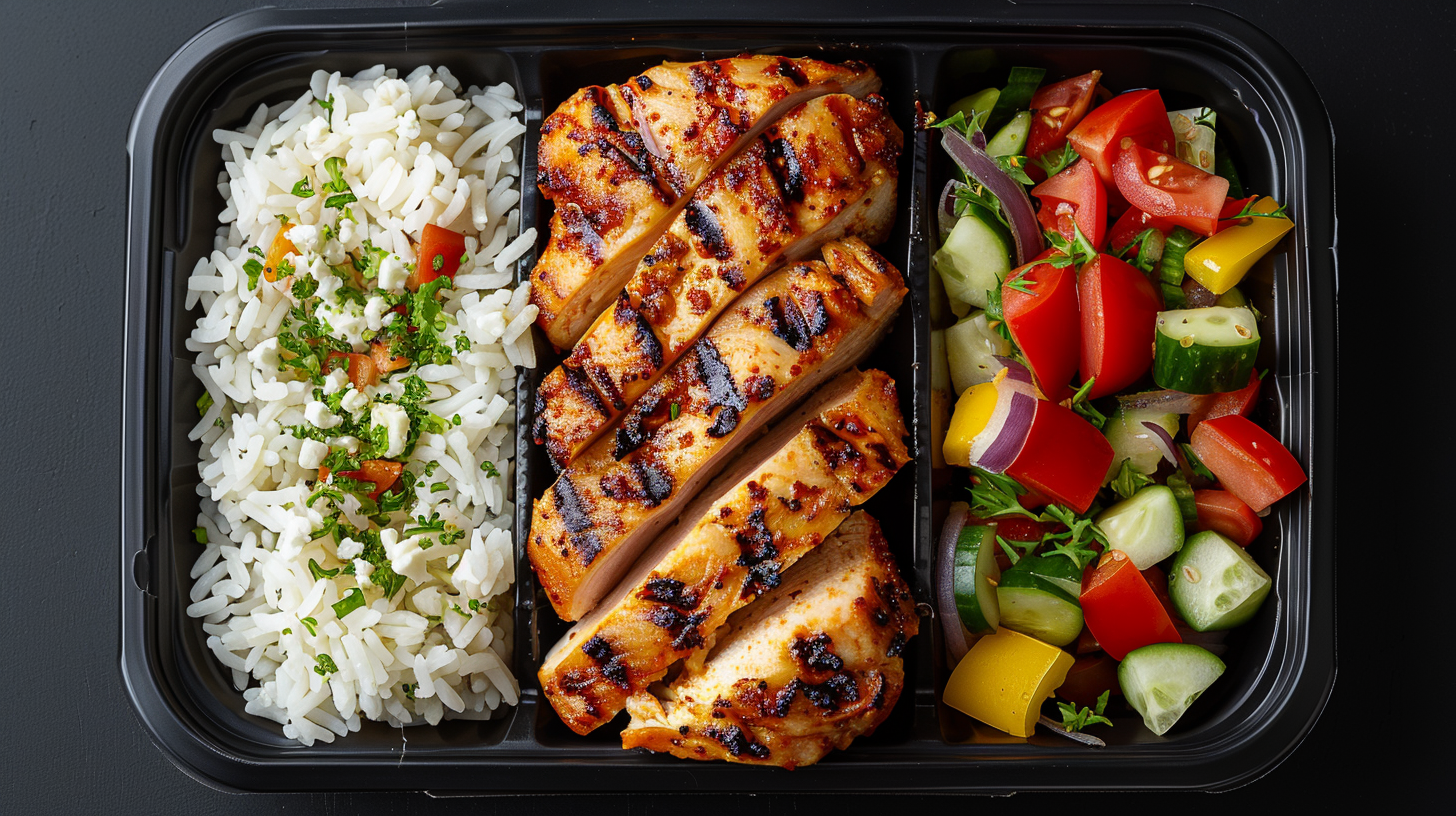.png)
Looking to fuel your athletic performance without gluten? Gluten-free meal plans for athletes provide a variety of options to support your training and recovery. These plans are designed to help you meet your nutritional needs while avoiding gluten-containing ingredients.
From high-protein meal plans to nutrient-dense options, there are plenty of delicious and satisfying choices to keep you at the top of your game. Whether you're a competitive athlete or just enjoy staying active, these meal plans can help you maintain peak performance while adhering to a gluten-free diet.
Key Takeaways
- Gluten-free meal plans can be optimized for athletic performance and recovery.
- Lean protein sources like chicken, turkey, and fish are suitable for gluten-free athletes.
- Incorporating non-starchy vegetables and healthy fats is important for essential vitamins and minerals.
- Following a gluten-free meal plan can help reduce inflammation and optimize overall health for athletes.
High-Protein Meal Plan
In a high-protein meal plan, you'll prioritize foods rich in protein to support your athletic performance and recovery.
For vegan options, consider incorporating plant-based sources of protein such as tofu, tempeh, lentils, quinoa, and chickpeas. These options provide essential amino acids necessary for muscle recovery and growth.
To maximize muscle recovery, aim to consume 20-40 grams of protein within the first two hours post-exercise.
Incorporating vegan protein sources into meals and snacks throughout the day can help you meet your protein needs for optimal recovery.
Additionally, consider a variety of protein sources to ensure you're obtaining all the essential amino acids necessary for muscle repair and growth.
Remember to prioritize whole foods and minimize processed vegan protein sources for overall health and performance benefits.
Low-Carb Meal Plan
To optimize your athletic performance and maintain a gluten-free diet, prioritize incorporating low-carb meal options that support sustained energy levels and muscle recovery.
When planning a low-carb meal plan for athletes, it's crucial to focus on performance fuel and endurance nutrition. Low-carb meals can still provide the necessary nutrients for athletic performance while minimizing the consumption of carbohydrates.
Opt for lean protein sources like chicken, turkey, and fish to support muscle recovery and repair. Include healthy fats from avocados, nuts, and seeds to provide sustained energy levels. Incorporate non-starchy vegetables such as spinach, kale, and broccoli to ensure an adequate intake of essential vitamins and minerals.
Nutrient-Dense Meal Plan
Maximize your athletic performance and maintain a gluten-free diet by prioritizing a nutrient-dense meal plan that focuses on quality and variety.
Nutrient-dense recipes are essential for athletes, providing a rich source of vitamins, minerals, and antioxidants. Incorporate a variety of colorful fruits and vegetables, lean proteins, healthy fats, and gluten-free whole grains to ensure you're getting a wide array of nutrients.
Energy-boosting snacks are also crucial for sustaining your performance throughout the day. Consider snacks like Greek yogurt with berries, homemade trail mix with nuts and seeds, or rice cakes with almond butter. These options provide a balance of carbohydrates, protein, and healthy fats to keep your energy levels steady.
Plant-Based Meal Plan
Prioritize a plant-based meal plan to optimize your athletic performance while maintaining a gluten-free diet. Incorporating protein sources such as quinoa, lentils, chickpeas, tofu, and edamame into your meals ensures you meet your nutritional needs. These plant-based proteins contain essential amino acids vital for muscle repair and growth.
Additionally, cooking methods such as grilling, baking, and sautéing help retain the nutrients in your gluten-free, plant-based meals. These methods also allow you to create flavorful and satisfying dishes without compromising your dietary restrictions. Experiment with marinating and seasoning your protein sources to enhance their taste and make your meals more enjoyable.
Paleo Meal Plan
For a gluten-free meal plan tailored to athletes, consider incorporating a Paleo meal plan to support your training and performance. The Paleo diet, based on foods presumed to have been eaten by early humans, emphasizes lean meats, fish, fruits, vegetables, nuts, and seeds while excluding grains, legumes, and dairy.
This approach aligns with athlete nutrition by providing a high-protein, nutrient-dense diet that can aid in muscle recovery and energy levels. The emphasis on whole foods in the Paleo diet can also contribute to reducing inflammation and optimizing overall health, which are crucial for athletes.
Mediterranean Meal Plan
To enhance your athletic performance while maintaining a gluten-free diet, consider incorporating a Mediterranean meal plan. This meal plan emphasizes fresh fruits, vegetables, whole grains, and healthy fats. Mediterranean flavor combinations such as olive oil, lemon, garlic, and herbs can add depth to your dishes without gluten.
Athlete-friendly ingredient swaps can include using gluten-free whole grains like quinoa or brown rice instead of traditional wheat-based grains. For protein, opt for lean meats, fish, and legumes. Replace traditional pasta with gluten-free options like zucchini noodles or chickpea pasta.
Snack on nuts, seeds, and yogurt for a quick energy boost. By focusing on fresh, minimally processed ingredients and utilizing Mediterranean flavors, you can create a delicious and nutritious gluten-free meal plan to support your athletic endeavors.

Frequently Asked Questions
Can a Gluten-Free Meal Plan Still Provide Enough Energy for Intense Athletic Training?
Yes, a gluten-free meal plan can still provide enough energy for intense athletic training. By focusing on balanced nutrition, you can ensure that your meals contain the necessary macronutrients and micronutrients to support athletic performance.
Emphasizing whole foods like lean proteins, healthy fats, fruits, and vegetables can help meet your energy needs. It's essential to plan and prepare meals carefully to ensure you're getting the fuel required for intense training.
Are There Specific Gluten-Free Meal Options That Can Help With Muscle Recovery and Repair After Workouts?
After intense workouts, muscle recovery is crucial. Incorporating gluten-free protein and carbohydrate sources into your post-workout nutrition can help with muscle repair. Opt for options like lean meats, eggs, quinoa, and sweet potatoes.
These foods provide essential nutrients for muscle recovery, aiding in the repair process. Including these gluten-free choices in your meal plan can support your athletic training and help you maintain peak performance.
How Can Athletes Ensure They Are Getting Enough Essential Vitamins and Minerals on a Gluten-Free Meal Plan?
To ensure you're getting enough essential nutrients on a gluten-free meal plan, focus on incorporating a variety of fruits, vegetables, lean proteins, and gluten-free whole grains like quinoa or brown rice.
Additionally, consider taking gluten-free supplements such as vitamin D, B vitamins, and omega-3 fatty acids to fill in potential nutrient gaps.
It's important to work with a registered dietitian or nutritionist to tailor your meal plan to meet your specific needs.
Are There Any Gluten-Free Meal Options That Can Help With Endurance and Stamina During Long Training Sessions or Competitions?
Feeling like you're hitting a wall during long training sessions or competitions? Look no further than gluten-free fuel for pre-workout snacks. Power up with options like banana with nut butter or rice cakes with turkey.
Hydration is key, so don't forget to replenish with electrolyte-rich drinks.
Post-exercise nutrition is crucial, so refuel with protein-packed meals like grilled chicken with quinoa and veggies to keep your endurance and stamina on point.

What Are Some Potential Pitfalls or Challenges to Watch Out for When Following a Gluten-Free Meal Plan as an Athlete?
When following gluten-free meal plans as an athlete, potential challenges may include ensuring adequate energy intake for athletic training. It's crucial to plan meals carefully to avoid nutrient deficiencies, especially in iron, B vitamins, and fiber.
Additionally, finding convenient gluten-free options and managing social situations can be challenging. However, with proper planning and knowledge, athletes can overcome these challenges and maintain a balanced, nutritious gluten-free diet to support their athletic performance.
Conclusion
So there you have it, a variety of gluten-free meal plans for athletes to choose from.
Whether you're looking to boost your protein intake, cut back on carbs, or focus on nutrient-dense foods, there's a plan that suits your needs.

Remember, the proof is in the pudding, so give these meal plans a try and see the difference they can make in your athletic performance.
The ball is in your court now, so go ahead and fuel your body for success.
Statistics
- Gluten-free meal plans can be easily integrated into an athlete's training routine.
- Athletes who follow a gluten-free diet may experience reduced joint pain and inflammation.
- Gluten-free meal plans can improve gastrointestinal symptoms in athletes.
- A gluten-free diet can help athletes discover new flavors and cuisines.
- Gluten-free meal plans can help reduce inflammation in athletes, promoting faster recovery.
- A gluten-free diet can help athletes avoid allergic reactions to gluten-containing foods.
- Athletes who follow a gluten-free diet may experience improved athletic performance.
- Athletes can find gluten-free alternatives for their favorite carbohydrate sources, such as rice and quinoa.
- A gluten-free diet can help athletes discover new and exciting food options.
- Gluten-free meal plans can support optimal energy levels during athletic performance.
External Links
How To
How to Create a Gluten-Free Meal Plan for Athletes
To create a gluten-free meal plan for athletes, start by assessing your individual nutritional needs and goals. Consult with a registered dietitian or nutritionist to ensure you're getting all the necessary nutrients. Next, focus on incorporating a variety of gluten-free grains, such as quinoa, rice, and buckwheat, into your meals. Include lean proteins like chicken, fish, tofu, and legumes to support muscle repair and growth. Don't forget to load up on fruits and vegetables for essential vitamins and minerals.
How to Find Gluten-Free Recipe Inspiration for Athletes
When looking for gluten-free recipe inspiration, turn to reliable sources such as cookbooks, food blogs, and reputable websites that specialize in gluten-free cooking. Look for recipes that are specifically designed for athletes, providing adequate nutrients and energy. Experiment with different flavors and cuisines to keep your meals exciting and appetizing. Don't be afraid to modify recipes to fit your dietary preferences and needs. Remember, gluten-free meals can be delicious and satisfying!
How to Meal Prep Gluten-Free Meals for Athletic Performance
Meal prepping gluten-free meals can be a game-changer for athletes. Start by planning your meals and creating a shopping list of gluten-free ingredients. Spend a dedicated day or evening batch cooking your meals for the week. Choose meals that are easy to portion and store, such as stir-fries, grain bowls, and casseroles. Invest in quality meal prep containers to keep your meals fresh and easily accessible. Label and store your prepped meals in the refrigerator or freezer, ready for quick reheating before workouts or competitions.
How to Identify Gluten in Packaged Foods for Athletes
When identifying gluten in packaged foods, it's essential to read labels carefully. Look for ingredients like wheat, barley, rye, and their derivatives, as these are common sources of gluten. Keep an eye out for "gluten-free" labeling, which indicates that the product is safe for those following a gluten-free diet. Additionally, familiarize yourself with gluten-containing additives and hidden sources, such as modified food starch or malt flavoring. If you're unsure about a product's gluten status, contact the manufacturer for clarification.
How to Dine Out Gluten-Free as an Athlete
Dining out gluten-free as an athlete can be enjoyable with a little planning. Start by researching restaurants in advance and choose ones that offer gluten-free options. Check their menus online or call ahead to ensure they can accommodate your dietary needs. When ordering, communicate clearly with your server about your gluten-free requirements. Opt for naturally gluten-free dishes like grilled meats, fish, salads, and vegetable sides. Be cautious of cross-contamination in shared fryers or food preparation areas. Trust your instincts and enjoy your dining experience!
How to Stay Consistent with Gluten-Free Eating as an Athlete
Consistency is key when following a gluten-free diet as an athlete. First and foremost, educate yourself about gluten-containing foods and their alternatives. Stock your pantry and fridge with gluten-free staples so that you always have options on hand. Plan your meals ahead of time and create a weekly meal schedule. Prep and pack your meals for training sessions and competitions to avoid relying on potentially gluten-containing foods. Surround yourself with a supportive network and seek advice from professionals experienced in gluten-free nutrition. Lastly, celebrate your progress and focus on how good you feel on your gluten-free journey!

 HealthWellnessFitnessBeautyVideosPrivacy PolicyTerms And Conditions
HealthWellnessFitnessBeautyVideosPrivacy PolicyTerms And Conditions
